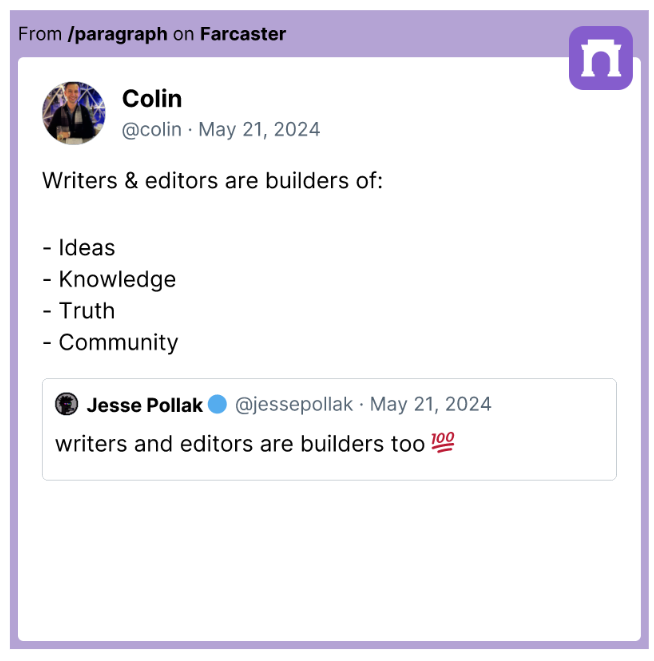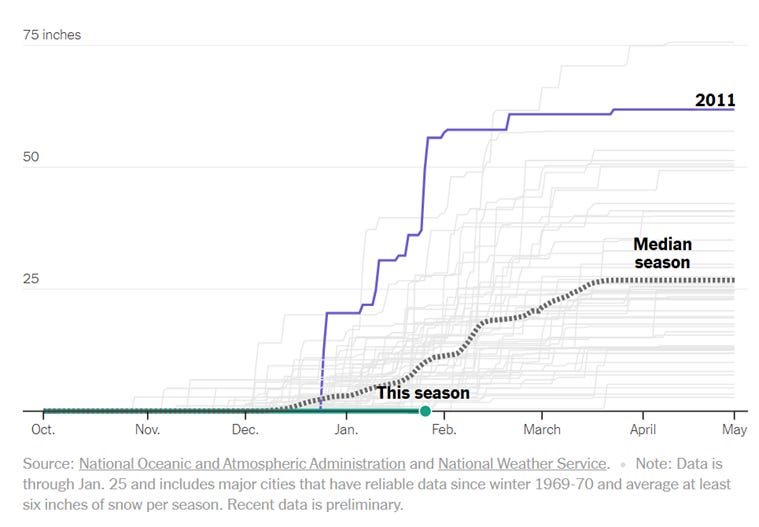Writing Hackathon and some other things
Welcome to the 36th entry of my public journal, where I share *some of the things* I've been thinking about, learning about, and exploring across work, tech, wellness, and life.
Dear Friends,
In this journal entry I write about the Farcaster Writing Hackathon I’ve been organizing with the help of some friends, a recollection of a snowy winter 13 years ago, a recap of an AI Roundtable event I hosted, and as always, a short collection of things I’ve been reading across the internet.
Farcaster Writing Hackathon
The Concept
I’ve been busy this month organizing a Farcaster Writing Hackathon, what I believe to be the first event of its kind. The idea is to create a mechanism to bring together thinkers and writers from across the ecosystem to contribute to the Farcaster canon, solve current challenges within the community, and help create Farcaster’s future.
As a venture backed startup, Farcaster (the protocol) & Warpcast (the client) has one job: find product market fit. As founder Dan Romero often says, unless Farcaster grows by several orders of magnitude, it’s just a science experiment. Dan’s strategy for finding PMF has largely been focused on developers. Because Farcaster is an open protocol on a blockchain network, as opposed to a corporate walled garden, it allows literally anyone with an internet connection to build clients, apps, or APIs on top of Farcaster data. If Farcaster were merely trying to mimic the functionality of existing social networks—X, Facebook, Reddit, TikTok, etc.—there would be no reason or incentive for anyone to use it, and it would be dead on arrival. However, the ability for anyone to build anything on top of an open social graph means that the killer app is likely something very different from the social networks we’re familiar with. Accordingly, developers have been getting a lot of love on Farcaster: there have been hackathons, grants, developer calls, etc.
One of the reasons I love Farcaster so much is the strong developer culture. Not a week goes by without a developer somewhere in the world building and launching something new on top of Farcaster - a new app, client, API, frame, dashboard. The best part is it’s all done permissionlessly - the developers have no formal relationship with the core Farcaster team. There is an open invitation for anyone to come and build.
Because of Farcaster’s desire to find PMF through developer creativity, developers have had outsized influence over the Farcaster roadmap. The easiest way to get Dan & Varun’s attention is to build on Farcaster. CTO & cofounder Varun hosts bi-weekly calls for developers and encourages developers to contribute to the protocol through Farcaster Improvement Proposals or FIPs.
This is all to say, developers are treated like royalty on Farcaster. With a background in engineering, I love to see it! Developers deserve their elevated status.
However, I’ve observed other types of builders who are just as passionate about Farcaster’s success. This hackathon is for one such class of builders—the writers.
Jesse Pollak, founder of Base, has said, “Writers and editors are builders too.” Colin Armstrong, founder of Paragraph, added that writers and editors are builders of ideas, knowledge, truth, and community. Steve Jobs once said, “The most powerful person in the world is the storyteller. The storyteller sets the vision, values, and agenda of an entire generation that is to come.” Mario Gabriele, founder of The Generalist, launched a VC fund on the promise of narrative power.
Farcaster has not yet found product market fit. Success is not guaranteed. All early users have a unique opportunity to make an impact and help create the future we want. Yes, developers have had significant influence and opportunities to make an impact, but writers are builders too. The idea for the hackathon was to give voice to the writers.
I imagined the Writing Hackathon as a way to bring writers together to publish a ton of Farcaster content en masse, leveraging Onchain Summer and network effects to create a PR blitz for Farcaster.
How It Works
The set up for the hackathon is fairly simple. There were two tracks: one in person in NYC, and one for remote folks using Gather. We provided 4 topics/themes for people to choose from, and people could participate as individuals or groups. The actual hackathon event was last Friday, June 21, which gave people an opportunity to come together, share ideas, meet new people. The deadline for publishing is 1 week later, this coming Friday, June 28.
There are just 2 rules people must follow:
Everyone ships (publishes)
Must be onchain
If you’re interested in learning more, you can find all the information here.
I’ll look forward to sharing the results of the hackathon later this summer.
Things Have a Way of Working Out
Earlier this month we celebrated the Bar Mitzvah of the youngest of my 3 children. Seeing him as a young adult got me thinking back to 13 years ago, the year he was born. I can vividly recall that winter as being very snowy. I remember because when I was pregnant and close to his due date, it seemed like every week brought a new huge snowstorm. I was scared he would arrive when we were snowed in. His due date was late January, but he came 2 weeks late, so there were at least 4-5 weeks where I thought he could come at any moment, and I was starting to mentally prepare for a home birth.
But I went into labor in between storms, and we had no problem getting out of the house. The drive to the hospital was easy and uneventful.
My take away from this story: things have a way of working out and feeling anxious about something outside of my control isn’t helpful.
As sure as I was about my memory, I know memories are unreliable so I searched online to verify and sure enough, 2011 was one of the snowiest seasons of the past 50 years. One article I found reminded me the winter was dubbed snowmageddan.
AI roundtable
Last week, I hosted an AI Roundtable with a guest speaker from Google AI. I’m a fan of the round table format. Unlike a webinar, where the audience expects to learn something from an expert presenter, my goal for roundtables is to bring together a group of peers to facilitate a conversation to promote peer-to-peer learning. I’m happy with how the event went. Our guest speaker presented for about 20 minutes on how Google is thinking about AI, and then our 15 or so attendees continued the conversation for the rest of time, sharing stories and asking each other questions about how they are leveraging AI in their organizations. A few takeaways:
The main advice from the session was to avoid trying to come up with a capital A capital S “AI Strategy” and just start practicing with AI. It’s similar to how we talk about introducing any new capabilities like DevOps, which is to start small and in a safe-to-fail space just for practice. Find a sand box, an internal project for example, and just start. Trying to build a corporate strategy will only put you farther behind.
There is a difference between Analytical AI and Generative AI. Most of the attention in the media focuses on Gen AI. Avoid using GenAI for analytical tasks and vice versa.
One comment that came up several times was the saying that “AI isn’t coming for your job, another person using AI is”.
Some of the Things (on the internet)
SaaS Perspectives - Interesting history of Software-as-a-Service and its relationship to the humble yet enduring spreadsheet.
Imposter syndrome - Great explainer plus practical advice for dealing with imposter syndrome.
On Streaks - Venture Capitalist Fred Wilson wrote every single day for 16 years. Streaks are bad if the platform is manipulating you, but they are a powerful tool for developing habits if we are the ones in control.
When am I ever going to need this? - Has there ever been a math class in the history of the world where a student hasn’t asked this question? I love how a 9th grade teacher answered this question: “Never. You will never use this.” But continues to compare studying math to lifting weights. Just like how lifting weights is practice for carrying your groceries, or lifting your grandchilden, or winning at sports, studying math is exercise for improving how you think, so you can be a better lawyer, doctor, architect, parent, etc.
State of the People - I was invited as a guest to a monthly live stream hosted by Riley Beans. Riley is a community builder and writer who I met on Farcaster and her overarching thesis is very similar to mine: “as we accelerate tech, we'll need to accelerate people at the same pace. through cultivating curiosity, play, and relationship building. things are about to get so much more wild and we need each other to be ready.”
Some of the Pics
Pics from top to bottom, left to right:
Got a new juicer as a birthday gift; my favorite juice to make is beet, carrot, celery, parsley. Also made watermelon-celery juice which is delightfully refreshing.
Hudson River views from the train platform
Variant office at the NYC Writing Hackathon
Look at who we saw on a walk through Rockefeller recently! They must have escaped from Stone Barns.
Closer up pic of the cuties.
Our nursery gave us a new variety of dill to plant this year, but it turned out to be chamomile! Should I harvest the flowers to make tea?
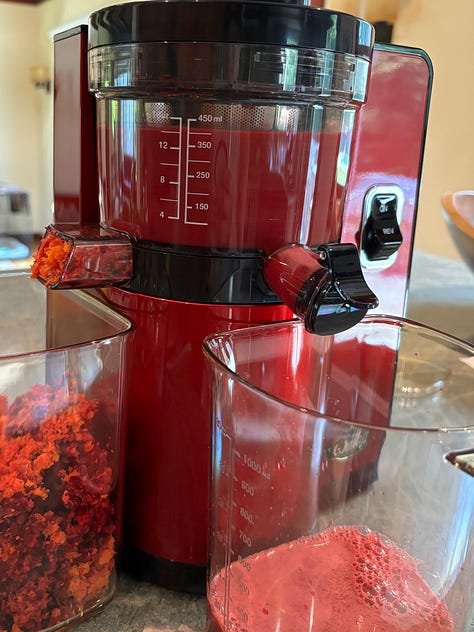

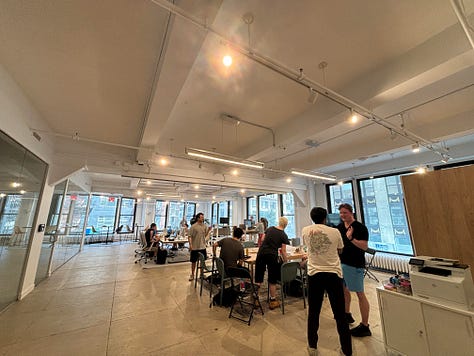

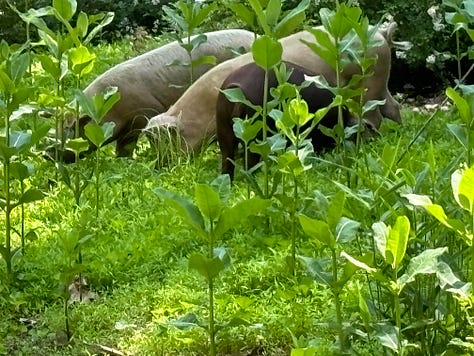

A Note to My Subscribers
I started this substack in December 2022 as an experiment to see if developing a writing habit would help clarify my thinking and/or provide other benefits. You can read about my original intentions in my first post or my more recent reflections after sticking with it for a year.
I write about twice a month and share musings, meditations, and links to things I’m finding interesting as I build out a farcaster-native media company, a modern technology consulting company, raise my kids, and have fun creating and learning in the worlds of crypto, tech, finance, science and wellness.
Thank you for supporting my writing and journey. If you’d like to get in touch you can reply to me here or find me on X and farcaster.
Until next time, keep putting good into the world. —adrienne🌏❤️


